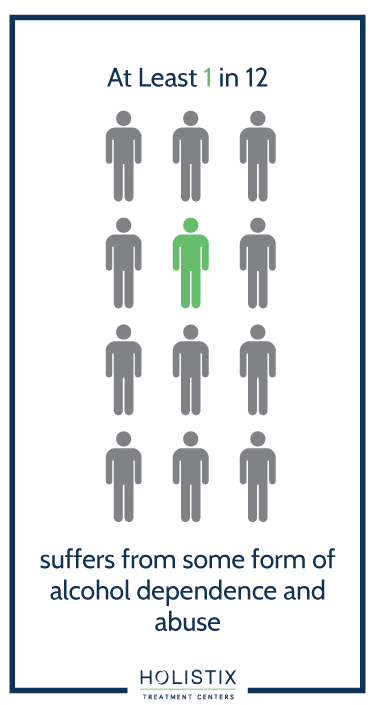The liver is a large organ that lies up under the ribs on the right side of the belly (abdomen). It helps filter waste from the body. It also makes bile to help digest food and stores sugar that the body uses for energy. Alcoholic hepatitis is inflammation of the liver that leads to liver cell damage and cell death. [1]
Immoderate alcohol consumption could result in fatty liver disease or steatosis, alcoholic hepatitis (A.H.), and eventually cirrhosis. Alcoholic hepatitis typically progresses to cirrhosis if drinking is continued. And for those who discontinue alcohol, hepatitis recovers to normal within a few months, but the cirrhosis that has already transpired does not reverse.

A survey of liver transplant programs conducted in 2015 revealed only 27% of the programs offering a transplant to A.H. (alcoholic hepatitis) patients. Of the 3,290 liver transplants performed, 1.37% were on A.H. patients. [2]

Get Your Life Back
Find Hope & Recovery. Get Safe Comfortable Detox, Addiction Rehab & Mental Health Dual Diagnosis High-Quality Care at the We Level Up Treatment Centers Network.
Hotline (877) 378-4154Causes of Alcoholic Hepatitis
When alcohol gets processed in the liver, it produces highly toxic chemicals. These chemicals can damage the liver cells. This injury then leads to inflammation and alcoholic hepatitis.
Although heavy alcohol use causes alcoholic hepatitis, doctors aren’t entirely sure why the condition develops. Alcoholic hepatitis develops in a minority of individuals who heavily drink alcohol — no more than 35 percent. However, it can also develop in people who moderately drink alcohol.
Possible Risk Factors for Alcoholic Hepatitis
Because alcoholic hepatitis doesn’t happen in all people who excessively drink alcohol, other factors may influence the development of this condition. These include:
- Genetic factors that affect how the body processes alcohol
- The presence of liver infections or other liver disorders, such as hepatitis B, hepatitis C, and hemochromatosis
- Malnutrition
- Being overweight
- Timing of drinking about eating (drinking during mealtimes lowers the riskTrusted Source of developing alcoholic hepatitis)

Women are at a higher risk of developing alcoholic hepatitis. This may be due to the variations in how the bodies of men and women absorb and break down alcohol.
Symptoms of Alcoholic Hepatitis
The Most Common Symptoms of Alcoholic Hepatitis:
- Belly (abdomen) tenderness or pain over the liver
- Nausea
- Vomiting blood or material that looks like coffee grounds
- Poor Appetite
- Yellowing of the skin and eyes (jaundice)
- Weight Loss
- Tiredness and Weakness
- Fever
Alcoholic hepatitis usually develops over time with continued drinking. But severe alcoholic hepatitis can develop abruptly. It can quickly lead to liver failure and death. [3]
The symptoms of alcoholic hepatitis may look like other health conditions or problems. Therefore, always see a doctor for a diagnosis.
Get Help. Get Better. Get Your Life Back.
Searching for Accredited Drug & Alcohol Rehab Centers Near You? Or Mental Health Support?
Even if you have failed previously, relapsed, or are in a difficult crisis, we stand ready to support you. Our trusted behavioral health specialists will not give up on you. Call us when you feel ready or want someone to speak to about therapy alternatives to change your life. Even if we cannot assist you, we will lead you wherever you can get support. There is no obligation. Call our hotline today.
FREE Addiction Hotline – Call 24/7Stages of Alcohol-Related Liver Diseases (ARLD)
There are three main stages of ARLD, although there’s often an overlap between each step. The National Health Service UK explained below the three stages of ARLD. [4]
I. Alcoholic Fatty Liver Disease
- Drinking a large amount of alcohol, even for just a few days, can build up fats in the liver. This is alcoholic fatty liver disease and is the first stage of ARLD.
- Fatty liver disease seldom causes any symptoms, but it’s a notable warning sign that you’re drinking at a harmful level.
- Fatty liver disease is reversible. If you discontinue drinking alcohol for two weeks, your liver should return to normal.
II. Alcoholic Hepatitis
- Alcoholic hepatitis (no relations with infectious hepatitis) is a likely severe condition caused by alcohol misuse over a lengthier period. When this develops, it may be the first time a person is conscious they’re damaging their liver through alcohol.
- Less commonly, alcoholic hepatitis can happen if you drink a large amount of alcohol in a short period or binge drinking.
- The liver damage associated with mild alcoholic hepatitis is usually reversible if you stop drinking permanently. Severe alcoholic hepatitis, however, is a painful and fatal illness.
- Many people die from the disease annually, and some people only find out they have liver damage when their condition reaches this stage.
III. Cirrhosis
- Cirrhosis is a stage of ARLD where the liver has become critically scarred. However, even at this stage, there may not be any apparent symptoms.
- It’s generally not reversible, but quitting drinking alcohol immediately can prevent further damage and significantly increase your life expectancy.
- A person who has alcohol-related cirrhosis and does not cease drinking has a less than 50% chance of living for at least five more years.
Comfortable Facilities & Amenities
High-Quality Addiction & Mental Health Rehabilitation Treatment
Rehab Centers TourRenowned Addiction Centers. Serene Private Facilities. Inpatient rehab programs vary.
Addiction Helpline (877) 378-4154Proven recovery success experience, backed by a Team w/ History of:
15+
Years of Unified Experience
100s
5-Star Reviews Across Our Centers
10K
Recovery Success Stories Across Our Network
- Low Patient to Therapist Ratio
- Onsite Medical Detox Center
- Comprehensive Dual-Diagnosis Treatment
- Complimentary Family & Alumni Programs
- Coaching, Recovery & Personal Development Events
Treatment Options for Alcoholic Hepatitis
Alcoholic hepatitis is an illness because of alcoholism. So, in conclusion, you need to stop drinking if you receive an alcoholic hepatitis diagnosis.
Quit Drinking
You may be able to reverse the injury to your liver by avoiding alcohol in the early stages of the disease. However, once more notable damage has occurred, the changes within the liver become permanent. Considerable damage can lead to conditions such as cirrhosis, blood clotting problems, and high bilirubin levels.
Even if the damage is too difficult to reverse, you should still stop drinking to prevent further harm to your liver. In people with permanent liver damage due to alcohol, there’s a 30% increase in survival rate among those who stop drinking compared to those who remain to drink.
Medication & Treatment
Treatment for alcoholic hepatitis may involve medications that lessen inflammation in your liver and improve liver function.
Your doctor may also prescribe vitamin and nutrient supplements if you’re malnourished. These nutrients may need to be administered through a feeding tube if you’re having trouble eating. Feeding tubes pass nutrient-rich liquids straight into your digestive system through different methods.
A medical professional may also advise a liver transplant if your liver is severely impaired. To qualify for a transplant, you must confirm that you won’t continue drinking if you receive a new liver.
You’ll also need to refrain from alcohol for at least six months before the transplant. In some cases, you may require to seek counseling as well.
Aftercare
Individuals with alcoholic hepatitis need long-term follow-up. Many can benefit from attending A.A. or a similar abuse treatment program. In addition, serology for viral hepatitis should be required, and period surveillance for liver cancer is suggested.
Furthermore, people with alcoholic hepatitis should also be immunized against hepatitis A, hepatitis B, influenza A virus, and pneumococcus. [5]
At We Level Up treatment center, we do not believe that long-term recovery comes in a one-size-fits-all program. For this reason, each client, upon arrival at our alcohol & drug treatment center, will undergo an extensive and comprehensive physical and psychological exam with our team of physicians; mental health specialists, spiritual advisers, and nutritionists.
Together, we will determine the client’s underlying issues so we can then customize an individualized approach and, when appropriate, provide integrated dual diagnosis treatment. In addition, the symptoms of the multiple disorders that can occur alongside addiction can present complex and similar symptoms. Therefore, proper diagnosis requires a highly trained professional staff with years of experience.
World-class, Accredited, 5-Star Reviewed, Effective Addiction & Mental Health Programs. Complete Behavioral Health Inpatient Rehab, Detox plus Co-occuring Disorders Therapy.
CALL (877) 378-4154End the Addiction Pain. End the Emotional Rollercoaster. Get Your Life Back. Start Drug, Alcohol & Dual Diagnosis Mental Health Treatment Now. Get Free No-obligation Guidance by Substance Abuse Specialists Who Understand Addiction & Mental Health Recovery & Know How to Help.
How We Can Help Here at We Level Up New Jersey
Recovery at We Level Up NJ treatment center utilizes a multidisciplinary and multidimensional approach. We incorporate various proven treatments that provide you or your loved one with opportunities for the most optimal treatment outcome: long-term sobriety.
Our treatment focuses on symptom reduction and the development of healthy coping skills and spiritual growth for our guests to attain an independent life filled with purpose, health, hope, and fulfillment. We Level Up also includes evidence-based therapeutic practices and offers support to family members and loved ones, friends, and the community at large.
Alcoholism Treatment & Detox
Treatment professionals at a rehab facility will be able to help you manage your pain with different medications. This allows you to focus on your recovery and get better.
Some individuals are fearful of stopping drinking due to concerns about the withdrawal symptoms associated with alcohol detox. While some individuals may have relatively mild symptoms of drinking, others may experience severe agony. In addition, withdrawal symptoms can change quickly and aggressively, which is why it’s important to detox under the care of medical professionals.
If you or someone you love is seeking a safe, secure, and compassionate resource for alcoholism treatment, We Level Up NJ treatment center is here for you. Call us and speak with an addiction counselor today about our levels of care and how to avoid alcoholic hepatitis.
Experience Transformative Recovery at the We Level Up Treatment Center.
See our authentic success stories. Get inspired. Get the help you deserve.



Start a New Life
Begin with a free call to an addiction & behavioral health treatment advisor. Learn more about our dual-diagnosis programs. The We Level Up treatment center network delivers various recovery programs at each treatment facility. Call to learn more.
- Personalized Care
- Caring Accountable Staff
- Comfortable Amenities
- Licensed & Accredited
- Renowned w/ 5-Star Reviews
We’ll Call You
Sources:
[1,3] Alcoholic Hepatitis – The Johns Hopkins University
[2,5] Alcoholic Hepatitis – National Center for Biotechnology Information, U.S. National Library of Medicine
[4] Alcohol-related liver disease – NHS National Health Service UK